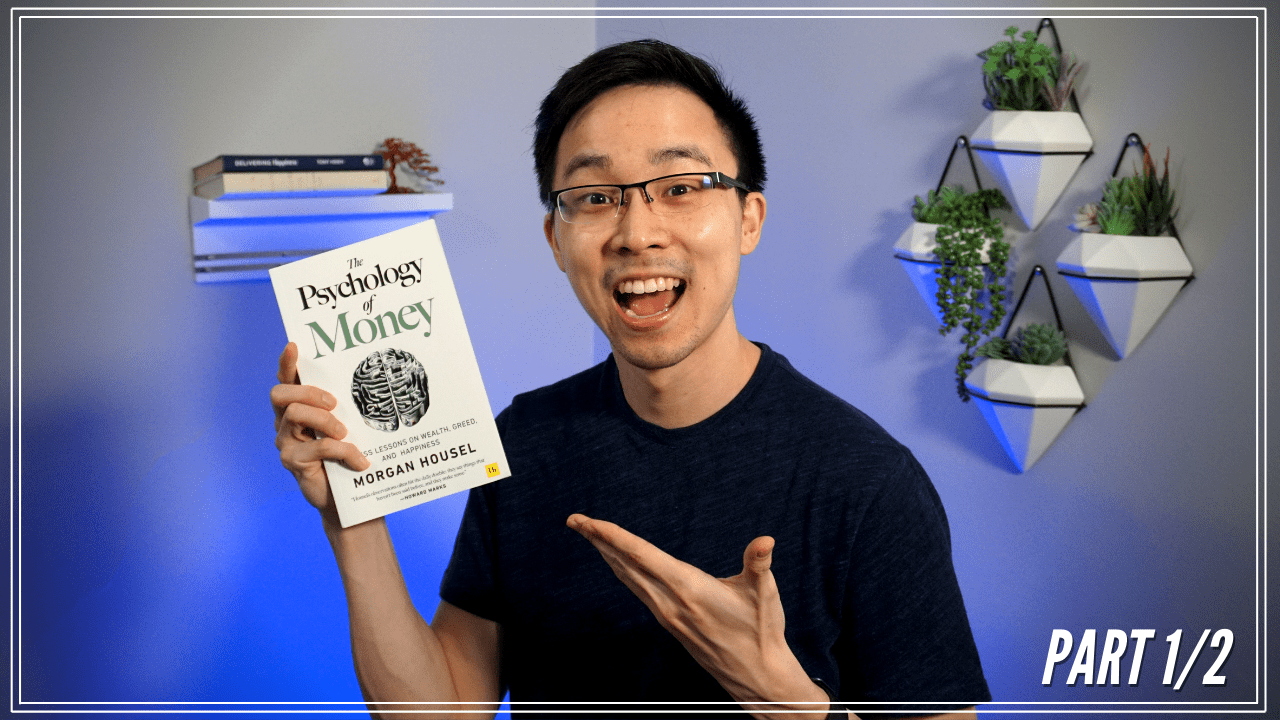Morgan Housel recently released his new book called The Psychology of Money. In this article, we’re going to review five points that I loved from this book. Along the way, I’ll share some personal reflections that I’ve had as an entrepreneur reading this book.
Point #1: No One’s Crazy
Housel’s perspective in this chapter is that everyone’s perspective is valid. And it’s important for you to factor that in when you think about your own biases, when you think about money.
An example that Housel shares is if you’re in your wealth building years in the years immediately after the great depression, you’re naturally going to be a lot more pessimistic than somebody that’s been building their wealth over the course of the last decade. So his main takeaway is to consider the differences that everybody has in their life experiences and the different biases as to why they might think a certain way.
I see this sort of bias and perspective in the startup space a lot. Over just the last five years, it’s become significantly less risky as well as easier to create a new venture. And as a result, startups are all the craze. It’s way easier and faster for you to create that e-commerce brand or that online business that you’ve been dreaming of because the barrier to entry is so much lower.
But ultimately, when you take a step back and you think about it, somebody in our parents’ generation didn’t have the luxury of advanced computing or Morris Law of kicking into effect in which now we have computers that are so advanced that they allow us to do all these sorts of systems and processes that we wouldn’t have been able to do just two decades earlier.
Point #2: The Role of Luck and Risk
The main takeaway from this chapter is that people tend to overweight their own contributions over the role of luck in their successes. And to further belabor this point, he speaks about how just as one person can be super lucky, another person can be super unlucky.
He includes a great story in the book about Bill Gates and Kent Evans. Kent Evans had a really similar upbringing to Bill Gates in terms of opportunities, the school that they went to, which happened to be one of the few high schools that had computers at that time. And they had very different life tails in terms of how their lives played out.
While Bill Gates obviously had the fortunate opportunity to create Microsoft in the time that he did, Kent Evans actually suffered from a tragic mountain climbing accident when he was still a teenager. He also tries to make the point here about just how lucky Bill Gates was in relation to his very good friend, Kent Evans. Just as lucky as Bill Gates was in creating this once in a generation company, Kent Evans also was equally as unlucky in experiencing this mountain climbing accident when there are very few of them in the United States every year.
I tend to agree a lot with this strategy. In fact, I’ve run a series of new sites in the past, all apply the same SEO strategy, the same keyword research, the same budget. Similar writers and I’ll get vastly different results. There’s just a ton of factors to break down when it comes down to creating a niche site.
There’s things like the niche, the competition, the writer quality, and even just the timing of when you created your site versus others. So what’s funny to me is that when I’ve invested in each of these projects, I’ve always set aside the same starter budget, but I’ve had vastly different results.
Some of the sites become profitable within six to 12 months. Whereas other sites are complete diets and they only make a buck or two every single month. I attribute these outcomes to luck and timing. Ultimately, when you’re playing long-term SEO, a lot of the winds that you’ll experience are only realized if you’re willing to play the game for a longer period of time and expand your time horizon.
And it works. If you take a step back and look year over year, as opposed to day after day, you can see the year over year growth of these sorts of sites when you’re able to invest consistent effort towards whatever you’re building.
Ultimately, whatever you’re building, it’s important that you don’t underestimate the role of luck and timing to your success.
Point #3: Understanding What Enough Is
Housel states that it was the inability to figure out what that enough point was that essentially led to the demise of the former CEO of McKinsey and Bernie Madoff.
It wasn’t necessarily because they didn’t create legitimate value early in their career that doomed them. It was the fact that they weren’t able to actually recognize when they had enough money to take a step back and look at what else was important in life. One of the things that I think is really important for everybody to go through their own journey on is understanding where a value of a dollar comes from.
For me, it really happened coming right out of college. At that point in time, I had the opportunity to take a healthy salary with a management consulting company, but I ultimately decided to join the startup that I’ve been building and take pretty much a poverty level salary. And it was during that entire year of earning close to nothing that I truly understood what it meant to earn a dollar and cherish that dollar.
That’s how I figured out what my enough point was, and it was from that, but I was then able to understand and cherish more of our successes as our business grew. Ultimately, that time period was super humbling for my ego and also taught me what I truly valued about money and what I didn’t value about money. And what I realized was after a while you figure out what your enough point is, and from there, the rest of it is all just gravy.
Point #4: Tails, You Win
Housel brings in the example of a traditional venture capital firm in which a VC firm is going to invest in 50 companies expect more than half of them to fail. But the reality is that two or three of those companies are going to be the ones that deliver exponential returns to the firm.
I can relate to this, even with my YouTube channel. When I was mapping out different video ideas for my first few videos, I thought my SEMRush tutorials were going to be way more popular than my Facebook Marketplace videos.
In fact, I only made the Facebook Marketplace videos because I wanted a low key starter topic that I felt comfortable speaking on as I started to learn how to create videos on YouTube. But lo and behold, months later, my SEMRush tutorials are less popular than my Facebook Marketplace videos. And my Facebook Marketplace videos make up 35% of the people that subscribe to this channel.
This sort of pattern of tilted returns towards 20% of your videos making up 80% of your results is something that’s not just uncommon to me, but it’s common across the entire space, not just YouTube, but in other industries as well. So my takeaway for other creators that might be watching this is don’t get too attached to just one thing that you’re building. Ultimately just spread your bets multiple times and then see what sticks.
Sometimes you’ll be surprised when the thing that you thought was going to perform the worst actually performs the best. But the most important thing to remember is to commit to doing the work. Because if you don’t get to, for example, a hundred videos created, then you never get to actually experience the tail end effects that gets you those exponential returns. As Housel, the author writes, tail wins everything.
Point #5: Freedom
In this chapter, Housel writes about how controlling your time is the highest dividend that money can pay.
He states that money is greatest intrinsic value is its ability to give you control of your time. To illustrate this point, he brings up the story of Derek Sivers who also happens to be one of my favorite entrepreneurs. When Derek was 22 years old, he was making 20K a year and he had a low cost of living. So once he was able to save up 12K, he was able to quit his job, take a few extra gigs on the side, since he was a musician to sustain his living. Ultimately he was free because he was able to quit his job and not work another job again.
But one of his friends happened to ask him, ” Hey, Derek. What about that time that you sold your company CD Baby for $22 million?” Derek’s response was that that didn’t make a big difference. It was simply more money in the bank. He had discovered the value of freedom at the age of 22.
Housel writes about how we’re all pretty similar in that we value quality friendships, we value feeling like we’re part of something bigger than ourselves. And when we have kids, if we have kids, that we get unstructured time with them and a lot of it.
I love this chapter and wholeheartedly agree. In fact, I thought it aligned really well with the writings of Rameet Sethi in the book I Will Teach You to Be Rich. Rameet talks about the definition of a rich life being one with good health, close relationship with friends and family and a fulfilling career.
As I’ve gotten older as an entrepreneur controlling my time has become one of the biggest levers that I am actively, always trying to adapt. In my earlier days, when we had less success, I had less control over my time because I was putting out fires. Whereas now, as things have gotten better, we’ve been able to hire more people to do more work and as a result, I’m able to focus more on strategic priorities than just being on the grounds every single day.
I talk about this sort of theme in other articles when I talk about the importance of valuing your time, hiring virtual assistants to help delegate for you and to make sure that you’re working on your business, as opposed to in your business.
Big takeaways
There are two things I want you to remember from this article:
- The first one is to not underestimate the role of luck whenever you are building something. You can just look at the personal finance space within YouTube to see both successes and failures when it comes to timing, luck and risk.
- The second big takeaway is to play games for the tails events. You’re never really going to know which of the efforts that you’re taking is going to be the one that hits it big. And so it’s better for you to expand your time horizon and keep playing the game.
If you found this article helpful, be sure to check out my YouTube channel to get new videos every single week I’ll help take you from zero to self-starter as you grow your business, get more customers, and hone your business acumen. Also, feel free to share this with anybody that you know that might from these takeaways from the Psychology of Money.

